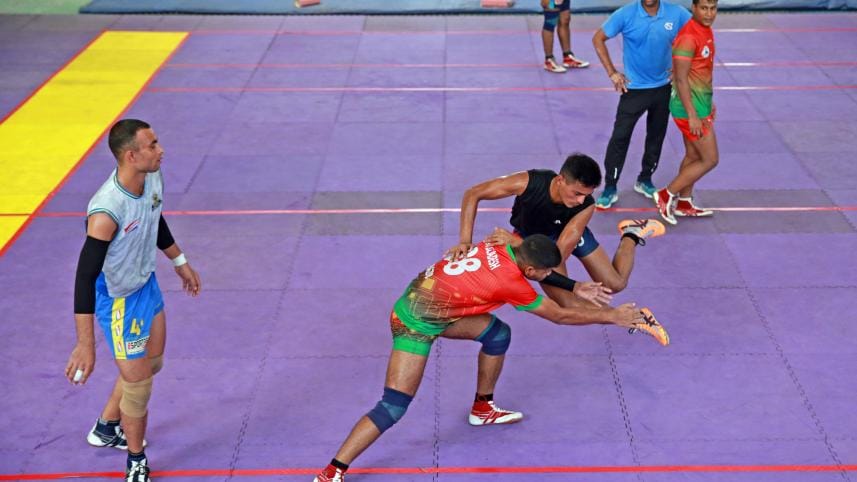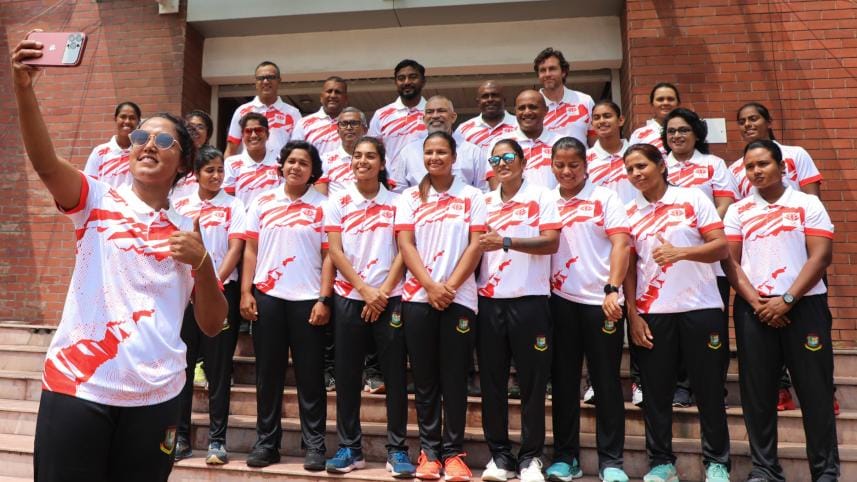Will raised aspirations end medal-drought?

Following two unsuccessful visits since its Asian Games debut in 1978, Bangladesh won its first medal in 1986.
It was boxer Mosharraf Hossain who opened the mark, bagging a bronze, and Bangladesh went on to win at least one medal in each of the next seven editions until 2014, with kabaddi and cricket accounting for all 11 medals.
Bangladesh's participation in the continent's multi-sports carnival, also known as Asiad, has grown since the 2010 edition; owing to the success of the South Asian Games in Dhaka the same year.
The financial constraint had once been one of the significant reasons behind restricted participation but now Bangladesh Olympic Association, with the government's assistance, has provided more financial aid to the federations to send their athletes to the Asiad.
Bangladesh returned home empty-handed from Jakarta in the previous edition. This time around, the organisers are expecting big things from a few disciplines such as archery, shooting, kabaddi, and cricket.
In Hangzhou, 180 athletes will compete in 17 disciplines, and the women's football team are set to make their debut. Let's take a look at where Bangladesh stands in each of those disciplines.
I can't ensure a medal but I can tell you that we are going to take part in the Games with the best possible team compared to the past... So, we can expect some good results from them.
Archery: It has been one of the fastest-growing sports in Bangladesh. Medals won in Asia Cup, World Cup, and World Championships showed great promise.
Bangladesh archers' best result in Asiad was to reach the quarterfinals of mixed recurve event in the 2018 edition. The archers have been erratic in international tournaments this season, but the return of Ruman Sana from suspension should offer Bangladesh a major boost in Hangzhou.
Athletics: England-based sprinter Imranur Rahman is the lone Bangladeshi representative in athletics in upcoming Asian Games. He is expected to qualify for the 100m semifinals -- a stage sprinter Mahbub Alam and Azharul Islam reached in 1998 and 2010, respectively.
A final berth is also possible if Imranur can carry his career-best timing of 10.11 seconds from a competition held earlier in September in Queen Elizabeth Park in London. However, earning a medal at the Hangzhou Asiad will be a daunting task, given a time of 10.00 seconds was required for bronze in the 2018 event.
"Of course, there is a possibility to qualify for the final but you must be aware of the competition," Imranur said.
Boxing: Mosharraf's feat inspired Bangladesh to send six boxers later but only to be eliminated in the first round at the Hiroshima Asian Games in 1994. Later, Bangladesh competed but with no success to account for. This time, three boxers – inexperienced Abu Talha, seasoned Salim Hossain, and US-based female boxer Zinnat Ferdous – will compete. All eyes are on Zinnat, who has been involved in boxing for the previous two years and bagged a bronze at the National Golden Gloves Championship 2023 in New York.
Cricket: After the sport was included in the 2010 Asian Games, Bangladesh ended a 34-year wait for an Asian Games gold. The men's cricket team won the highest prize, while the women sealed silver. The men's team had to settle for bronze at the Korea Asian Games in 2014 after a defeat to Sri Lanka decided by coin-toss in the semifinals, whereas the women's team retained silver after losing again to Pakistan.

Cricket returned to the Asiad after a one-edition gap. To win a medal here, especially for the men's team with a depleted squad, will be difficult this time. The women's team, though, have a good chance to win at least a bronze.
Chess: Bangladesh will compete in chess for the third time, following appearances in 2006 and 2010. Bangladesh's men finished seventh and tenth in the 2006 and 2010 tournaments, respectively, while the women finished seventh in 2010. This time, three players will compete in individual events: GM Enamul Hossain Razib, Fahad Rahman, and Noshin Anjum. In standard team events, GM Niaz Murshed and GM Ziaur Rahman will participate along with Razib and Fahad, who could gain a GM norm.
"China, India, Iran, Uzbekistan, Vietnam and Kazakhstan are also strong nations in the world of chess… but we will try to finish within top 10 in the team event," said GM Razib.

Football: Of Bangladesh's 11 Asiad appearances, footballers participated nine times and won only four matches in 25 outings: against Malaysia (1982), Nepal (1986), Afghanistan (2014) and Qatar (2018). The best result, of progressing to the knock-out stage, occurred at the 2018 edition in Jakarta.
This time, key players are unavailable due to the Bashundhara Kings' engagement in the AFC Cup. And, with China, India, and Myanmar as group-stage opponents, head coach Javier Cabrera is unwilling to "set a long-term or mid-term target," preferring to focus on one game at a time.
Gymnastics: The withdrawal of New Zealand-based gymnast Ali Kader leaves two young gymnasts in individual events: Abu Saeed Rafi and Sangkheong Khumi. Korean coach Cho Sung Dong has low expectations for young Khumi and Rafi but wants to avoid humiliation when competing against world-class gymnasts from China, Japan, and other countries.
Back when US-based gymnast Syque Caesar advanced to the finals of two events -- parallel bar and horizontal bar -- in 2014, it marked Bangladesh gymnastics' best results in Asiad.
Golf: Golf may not be the most popular sport in multi-sport events like the Asian Games, but it has been a part of Asia's largest sports carnival since 1978. Bangladesh, on the other hand, has only competed in the last two editions.
Bangladesh's participation had no realistic prospect of claiming any medals because professionals were not permitted until the last edition. With the amateur-only regulation removed this time, Bangladesh is sending two of its finest and in-form golfers, Siddikur Rahman and Jamal Molla, to Hangzhou. Advancement into the top ten is the minimum goal.
Hockey: Bangladesh has regularly competed in Asiad but has never won a medal; the best results so far have been sixth-place finishes in 1978 and 2018. After a three-month preparation, Korean coach Young Kyu Kim set an ambitious goal of reaching the semifinals for the first time. The reality, however, makes maintaining sixth place extremely difficult, as they must pull off an upset or two to secure at least third place in Pool A, which includes a superior India, Pakistan, Japan, and two teams that Bangladesh would hope to defeat.
Kabaddi: Of 12 medals, kabaddi delivered seven – four silver and three bronze medals – since inclusion of kabaddi at the Asiad in 1990. The men's team won a medal in five consecutive editions, but none in the last three, while the women's team won silver and bronze in 2010 and 2014. However, none of them were able to earn a medal in the previous tournament. This time, both teams are keen to rebound, especially after a month-and-a-half of training in India with two Indian coaches - Chazu Ram and Lingampally Srinivas Reddy.
Shooting: Asif Hossain Khan's gold medal in 10m air rifle at the 2002 Commonwealth Games was a significant feat, picking the baton from Ateequr Rahman and Abdus Sattar Nini who had set an example by winning gold in the pair event of 10m air pistol at the 1990 Commonwealth Games.
However, none of Bangladesh shooters were ever able to reach the finals in Asiad. Despite training with foreign trainers and competing in international meets throughout the years, there is little scope for optimism for the 15 shooters in Hangzhou.
Weightlifting: Srity Akhter, Nayeem Hossain and Mabia Akter Simata, South Asian Games double gold medalists, have trained with three different instructors in preparation for the Asiad. The spotlight, however, will be on Mabia, who is seeking to improve on her previous best of sixth place in the Games to move up to fifth place in the 64k category.
"If you talk about medals, I will be embarrassed because you know the level of competition in Asian Games," said Mabia.
Swimming: Bangladesh's participation in Asiad has been somewhat consistent, although no officials were able to verify that the swimmers passed the heat hurdles in various events so far. Only two swimmers, Samiul Islam Rafi and Sonia Khatun, will compete in different four events in Hangzhou out of the 25 who took preparation with "keeping SA Games in mind.
"We will be hoping both swimmers to put their personal best in the Asian Games," coach Mohammad Moniruzzaman said.
Taekwondo: Bangladesh was eliminated in the first round in both of its appearances in 2010 and 2014. Lee Ju-Sang, the long-serving Korean coach, wants his charges, Nooruddin Husain, Md Eleas, and Ruma Khatun, to put up an improved show and win two matches.
Bridge: After finishing 11th in the team event and 20th in the pair event in the 2018 edition, Bangladesh Bridge Federation general secretary Naimul Hasan set a goal of reaching the semifinals in both competitions.
Karate: Bangladeshi failed to impress in their Asiad debut in 2010. This time, five karateka, including SA Games gold medallist Humaira Akther Antara, will face a stern test from her counterparts from Japan, Iran, Saudi Arabia, China, and Kazakhstan, which are Olympic medal-winning nations.
Fencing: Bangladesh is ready to make its Asiad fencing debut following their performance at the South Asian Games. Fatema Mujib (SA Games gold winner), Farjana Easmin Nipa (SA Games bronze medallist), and Roksana Khatun (national silver medallist) have been picked to compete, with a South African coach training them for three months.



 For all latest news, follow The Daily Star's Google News channel.
For all latest news, follow The Daily Star's Google News channel.
Comments